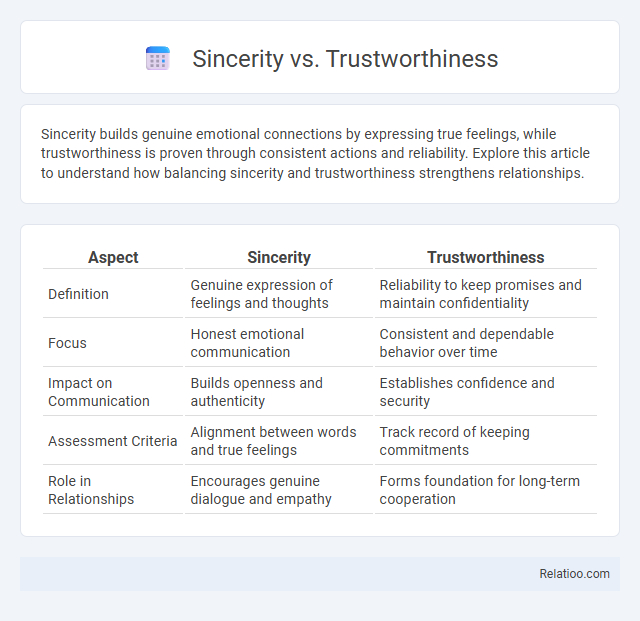Sincerity builds genuine emotional connections by expressing true feelings, while trustworthiness is proven through consistent actions and reliability. Explore this article to understand how balancing sincerity and trustworthiness strengthens relationships.
Table of Comparison
| Aspect | Sincerity | Trustworthiness |
|---|---|---|
| Definition | Genuine expression of feelings and thoughts | Reliability to keep promises and maintain confidentiality |
| Focus | Honest emotional communication | Consistent and dependable behavior over time |
| Impact on Communication | Builds openness and authenticity | Establishes confidence and security |
| Assessment Criteria | Alignment between words and true feelings | Track record of keeping commitments |
| Role in Relationships | Encourages genuine dialogue and empathy | Forms foundation for long-term cooperation |
Understanding Sincerity: Meaning and Importance
Sincerity refers to the genuine expression of one's true feelings, thoughts, and intentions without deceit or pretense, serving as the foundation of authentic communication. Unlike trustworthiness, which emphasizes reliability and the ability to keep promises, sincerity centers on honesty and emotional transparency in interactions. Understanding sincerity is crucial as it fosters deeper connections, builds emotional intimacy, and promotes a culture of openness and respect in personal and professional relationships.
Defining Trustworthiness in Daily Life
Trustworthiness in daily life refers to consistently demonstrating reliability, honesty, and integrity in actions and promises, fostering confidence in relationships. It is the foundation for building strong personal and professional connections, as others depend on trustworthy individuals to uphold commitments and behave ethically. Trustworthiness differs from sincerity, which emphasizes genuine expression of feelings, though both contribute to authentic and dependable interpersonal interactions.
Core Differences Between Sincerity and Trustworthiness
Sincerity reflects honesty and genuineness in expressing thoughts and feelings, while trustworthiness involves consistently demonstrating reliability and integrity in actions and decisions. The core difference lies in sincerity being about authentic communication, whereas trustworthiness is about the dependability of one's behavior over time. Your relationships thrive when both sincerity in expression and trustworthiness in conduct are present and aligned.
How Sincerity Influences Personal Relationships
Sincerity directly impacts personal relationships by fostering genuine communication and emotional openness, which builds deeper connections. Your honest expressions encourage trustworthiness, making others feel valued and understood. Consistent sincerity eliminates misunderstandings and strengthens mutual respect, essential for lasting bonds.
The Role of Trustworthiness in Building Trust
Trustworthiness plays a crucial role in building trust by consistently demonstrating reliability, honesty, and integrity in actions and communication. Unlike sincerity, which reflects genuine feelings and intentions, trustworthiness is judged by the predictability and dependability of behavior over time. You can cultivate stronger relationships and foster a secure environment by prioritizing trustworthiness as the foundation for trust.
Sincerity vs Trustworthiness: Common Misconceptions
Sincerity and trustworthiness are often mistakenly used interchangeably, yet sincerity refers to genuine expression of feelings, while trustworthiness is about reliability and integrity in actions. Many assume a sincere person is automatically trustworthy, but sincerity alone does not guarantee consistent ethical behavior or dependability. Understanding this distinction enhances interpersonal relationships by setting clearer expectations for honesty versus accountability.
Practical Examples of Sincerity and Trustworthiness
Sincerity involves honestly expressing genuine feelings and thoughts, such as openly admitting a mistake at work or giving heartfelt compliments to colleagues. Trustworthiness, on the other hand, is demonstrated by consistently keeping promises and safeguarding confidential information, like delivering projects on time and honoring agreements. Both qualities enhance professional relationships, but sincerity builds emotional connection while trustworthiness establishes reliability and dependability.
Enhancing Both Sincerity and Trustworthiness
Enhancing sincerity and trustworthiness requires consistent honesty, transparent communication, and genuine actions aligned with one's values. Demonstrating empathy and reliability reinforces both qualities, fostering deeper connections and mutual respect. Building trust while maintaining sincerity involves actively listening and being accountable in personal and professional relationships.
Challenges in Balancing Sincerity and Trustworthiness
Balancing sincerity and trustworthiness presents challenges due to the potential conflict between honest expression and the need to maintain reliability. Genuine openness can sometimes risk offending others or revealing vulnerabilities, which might undermine trust. Navigating these dynamics requires careful communication to ensure authenticity while preserving confidence and dependability.
Why Both Qualities Matter in Modern Society
Sincerity and trustworthiness are foundational qualities that shape meaningful relationships and social cohesion in modern society. Sincerity ensures that your intentions and expressions are genuine, fostering authentic connections, while trustworthiness guarantees reliability, enabling others to depend on your actions and commitments. Both qualities matter because they build mutual respect and transparency, essential for effective communication and collaboration in personal, professional, and community contexts.

Infographic: Sincerity vs Trustworthiness
 relatioo.com
relatioo.com